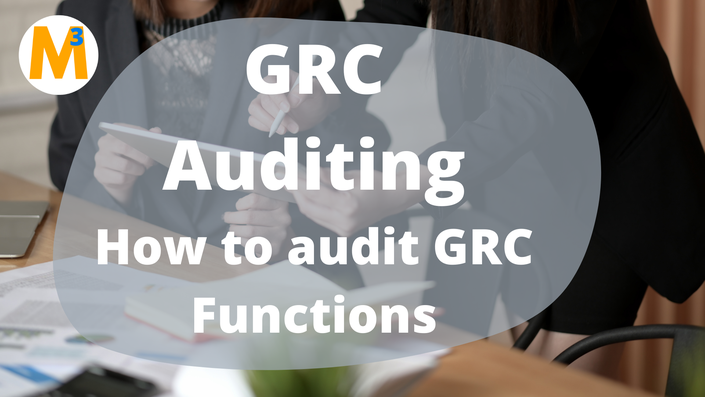
GRC Auditing
Field: Auditing | Delivery Method: Self Study | CPE Hours: 5.0
This course was developed to show you how to audit GRC capabilities.
This course no longer serves as a means to obtain your GRC Audit certification from OCEG, since OCEG changed it's certification process, but you will still find value if you are auditing GRC functions.
Since this is a pre-recorded, on-demand video training, you can start your training as soon as you register, and you can take the course at your own pace. This allows you the flexibility to study when and where you prefer - whether you have just a few minutes at a time, or want to go through the training at one time.
You can get access to the course immediately, when you register now.
Course Curriculum

"I took the GRC Audit course and found it to be well organized. Mr. Mefford did an amazing job at explaining the concepts is a clear manner, and I found the course extremely interesting. Upon completing the course I was able to obtain my GRC Audit certification from OCEG. I am so pleased with the course and would recommend it to anyone who wants to improve their career in GRC.” - Nicholas Holdcraft, President and COO at GOVECS
GRC AUDIT TRAINING MODULES
GRC Audit Modules #1-#3
In these three modules, you'll learn about the GRCA certification process, Principled Performance, the OCEG GRC Capability Model, how to use the GRC Capability Model for risk assessments, risk-based auditing, how to use the GRC Assessment Toolkit (Burgundy Book) to perform GRC audits, and how to obtain organizational certification on a GRC capability.
Audit Basics Module
In this module you’ll learn about the auditor's role in the organization, steps to an audit project, appropriate criteria to use in a GRC audit, who should perform the audits, and considerations when performing GRC audit.
Professional Audit Standards Module
In this module, you'll learn how auditors use professional audit standards when performing audits. Audit standards vary around the world depending on geography, type of audit engagement, and type of auditor. We use as examples standards from the American Institute of Public Accountants (AICPA) and the Institute of Internal Auditors (IIA) to help illustrate how auditors use professional standards.
Attributes of an Auditor Module
In this module, you'll learn the concepts of independence, objectivity, and due professional care - attributes that are necessary for one to perform audits in a professional manner, with a high-level of assurance.
Planning Audits Module
In this module, you'll learn how to plan audits. This includes determining the objective and scope of the audit, understanding the applicable criteria, processes, controls, and identifying the information available to audit, so the auditor can develop a work program.
Performing Audits Module
In this module, you'll learn about audit testing methods, sampling, and documentation when performing audits.
Report and Monitor Audit Results Module
In this module, you'll learn how to report the results from the audit to stakeholders, and ways in which the auditor can monitor recommendations from the audit to ensure those recommendation are implemented.
Your Instructor

Jason Mefford is a rock star in internal audit, risk management and compliance. He typically works with Chief Audit Executives (CAE), Audit Committee (AC) members, and professionals in audit, risk and compliance with the technical and soft-skills needed to navigate the land mines of organizations. He takes complicated, confusing and hard things, makes them practical, proactive and simple to improve learning and transformation.
He's been a Chief Audit Executive, Chief Risk Officer, Chief Ethics and Compliance Officer, Chief Information Security Officer, Board Member, and has trained and consulted organizations all over the world. He is a thought leader in all things governance, risk and compliance (GRC) and internal audit, and is the recipient of multiple awards including:
- Rising Star in Corporate Governance from Yale University
- Rising Star in Corporate Governance Award (Finalist) from Corporate Secretary Magazine
- Thought Leader of the Year (Finalist) from The National Association of Experts, Writers & Speakers
- Fellow from the Open Compliance & Ethics Group (OCEG) Think Tank
You can learn more about him at: https://www.jasonmefford.com and join him in the Audit Leader Forum™ at: https://bit.ly/AuditLeader
